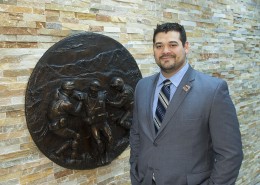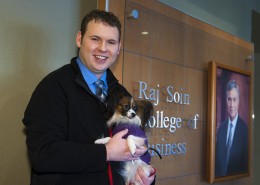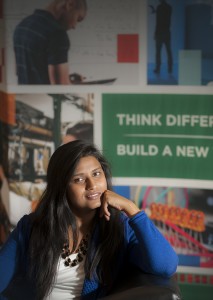
Of the 1,178 students who applied for degrees, 725 are receiving their bachelor’s, 421 their master’s and 15 their Ph.Ds.
The Wright State University Nutter Center will be packed with a raucous crowd Saturday, Dec. 13, at 10 a.m. And though thousands will cross the finish line, it will not be an athletic endeavor.
The journey to earning a college degree takes commitment, determination and aptitude. In front of the family members, friends and professors who supported them on their journey, more than 1,100 Wright State University students will finish what they started by picking up their long-anticipated diplomas at Fall Commencement.
Of the 1,178 students who applied for degrees, 725 are receiving their bachelor’s, 421 their master’s and 15 their Ph.Ds.
The Fall Commencement class includes graduates ranging in age from 20 to 70 and hailing from 47 Ohio counties and 20 different states. There are 196 international students from 16 nations, with India boasting the single largest number of foreign graduates with 135.
And this graduating class has some smarts. A total of 67 students are walking away with 4.0 GPAs.
Here are just a few of the notable graduates and their stories:
A leader among leaders

Anthony Hinojosa stands in front of the Wright State Veteran and Military Center, which he helped to create.
Anthony Hinojosa, 31, will leave Wright State with a bachelor’s in international studies and a minor in political science but his legacy on the Dayton Campus will last forever.
When Hinojosa arrived at Wright State in 2012 as a transfer student, he was fresh off a 10-year career in the Navy. Hinojosa served his country by supporting special warfare operations for units like the SEALs and much of his service is classified.
Like many veteran students on campus, he wanted to keep his head down and get his work done but not get involved. Wrestling with re-introduction to the civilian world, student life and military experience he largely couldn’t talk about, Hinojosa found fellow student veteran Anthony Heiland.
Through a relationship not unlike the new Battle Buddy program at Wright State, which helps students like him by pairing them up with a fellow student veteran mentors, Heiland and Hinojosa supported each other and became close friends.
Heiland insisted that Hinojosa get involved on campus and first and foremost with a burgeoning student organization called Veterans League.
It wasn’t long before the two Anthonys were on a new mission — collecting signatures for a petition that would ultimately create the new Veteran and Military Center, which opened in November 2014.
“Our main focus was to get a one-stop shop for veterans to deal with their benefits, a place to relax, a place to get away from the crowds, a place that was for veterans,” said Hinojosa, who also joined Student Government and became a visible student leader on campus.
Focused on helping future veterans at Wright State, Hinojosa never dreamed that the new center would be built while he was still a student. But that’s exactly what happened. His dream was realized one month before graduation.
“I believe Wright State is the best place for veteran and military students. The faculty have always been helpful and understanding. The benefits processing and support here has been streamlined and is just top notch. And now we have this beautiful space,” said Hinojosa.
Once a student who didn’t want to get involved, now he insists on talking about what Wright State has done for him and what it can do for any veteran willing to take a chance like he did.
“Veterans that came here had options to attend other schools, but they chose Wright State. I say to them, ‘get involved and find out really why that choice was the best one you ever made.’ When you join the Veterans League or become a student worker in this center, you help others like yourself and you leave a legacy,” said Hinojosa. “We are each others champions.”
Raider pup!

Brandon Yanak made the most of his college experience by serving his two loves: accounting and animals.
Brandon Yanak, 21, will receive his bachelor’s in accounting and a minor in management. His college career has been defined by taking involvement and leadership to a new level.
“Every experience in life is an opportunity to grow and learn something new,” said Yanak, who will graduate Summa Cum Laude as a university honors scholar with a 4.0 grade point average.
Yanak is the president of the Beta Alpha Psi business honor society chapter at Wright State, and is also a member of the Accounting Club, the John Talbott Accounting Leadership Program, FETCH!, the Ohio CPA Foundation’s financial literacy program and the Wright State service dog training program 4Paws WSU.
“College is the perfect opportunity to branch out and get involved,” said Yanak, who is passionate about accounting and his love for animals.
His love for accounting led him to The Ohio Society of CPAs’ Student Ambassador Program.
As an ambassador, Yanak promoted accounting and the CPA profession to other students by giving multiple presentations to classrooms and organizations that focus on the opportunities and benefits of careers in accounting.
Yanak also created a new program on campus by partnering with Wright State’s Multicultural Affairs and Community Engagement division. Inclusiveness in Accounting aims to strengthen diversity and inclusion in accounting.
“The goal was to expose the unlimited opportunities and benefits of accounting to a wider audience of undecided college students,” said Yanak. “By reaching out specifically to underrepresented groups, we hope to make them feel welcome, wanted, and that a future is there for them in accounting.”
A member and former treasurer of 4Paws WSU and the co-founder and writer for Neighborhood Friend of the Week in his hometown near Cleveland, Yanak’s love for animals also drives him to be involved.
“Time management means making time for what is important. Is it hard and stressful sometimes? Of course. But life is about combining love, passion, community commitment and responsibility into a whole being. None of those are neglected in my life,” said Yanak.
“I tell freshmen, commit to your academic career and pursue the best possible grade you can achieve in every class,” says Yanak. “After you have a good academic footing, get involved and network. All the resources you need to succeed and get a job after graduation are here at Wright State.”
Energy efficient
With almost no money to pay for classes but an indomitable spirit to earn a master’s degree in the United States, Shweta Chauhan, 24, bet on herself and traveled over 13,000 miles from Dehradun, India, to Dayton, Ohio, to make it happen.
After her father took loans on their family property to pay for her first two semesters, Chauhan began classes in the College of Engineering and Computer Science’s electrical engineering program in 2012 with no guarantees of financial aid or support beyond what the loan money could pay for.
In just two terms of study that all changed.
“I have always loved electrical engineering. I got my bachelor’s in electronics and communication engineering from Jawaharlal Nehru Technological University, but knew I could do more,” said Chauhan. “Wright State’s program was a great fit because of the research opportunities and the excellent faculty I hoped to work with.”
Chauhan showed immediate aptitude and quickly became one of the program’s top students after breezing through her second semester while carrying an unheard of 15-credit hour load at the master’s level.
By her third semester, Chauhan had begun teaching as a graduate assistant, earned a competitive master’s thesis candidate slot with the department chair and convinced the department to fully fund her classes and research — high-frequency electronic systems.
“This was an area that Dr. (Marian) Kazmiarek had not worked a lot in before, so he encouraged me to pursue my research,” said Chauhan. “These techniques are being used in some devices but there’s still lots of opportunity for improvement.”
An early course that required extensive study of control loops inspired her to seek improved power efficiency in tablets and smartphones by using higher frequencies but less components.
She’s hoping her story of doing more with less inspires others too.
“There were many times where I thought I couldn’t do it anymore. I started over and over again with difficult subjects until I finally got them,” said Chauhan. “Believe in yourself. Everyone in this world has talent. Through hard work, anything is possible.”


 Cosmic collection
Cosmic collection  Wright State revives student-faculty collaborative writing journal
Wright State revives student-faculty collaborative writing journal  Fulfilling dreams
Fulfilling dreams  Wright State alumna Nicole Scherzinger wins top British theatre award as star of ‘Sunset Boulevard’
Wright State alumna Nicole Scherzinger wins top British theatre award as star of ‘Sunset Boulevard’  Healthy competition
Healthy competition 